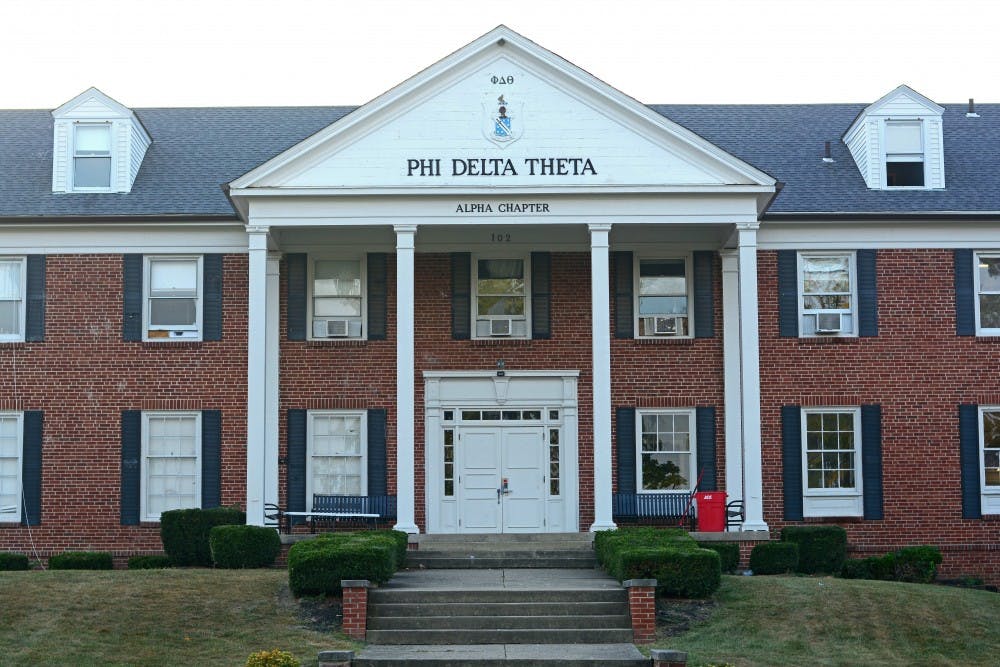Miami University’s Phi Delta Theta (Phi Delt) fraternity has begun the process of “recolonization” after being suspended in the fall of 2017. An informal recruitment process is beginning this fall, and formal recruitment for freshmen will take place during the spring of 2020.
Approximately 40 years after Miami was chartered, six students banded together to form Phi Delt, headquartering the organization at Miami and becoming the “alpha chapter” of 191 chapters nationwide.
Almost two centuries later, the Alpha chapter was suspended from Miami’s campus by its national council for violating their risk-management policies. Prior to the suspension, the chapter was on probation for failing to observe the alcohol-free housing policy. The chapter has been suspended from campus multiple times in the past two decades, also for violations of risk-management and alcohol policies.
Risk-management policies are guidelines for a Greek chapter instituted by its respective national organization and are meant to promote the safety and well-being of the members. Typically, the policies set rules regarding alcohol consumption in the house or at registered events, anti-hazing rules and new member education guidelines.
The national headquarters of the fraternity released a statement regarding the suspension, saying, “Phi Delta Theta is committed to the health and safety of its members,” adding that the chapter would return in the fall 2019 semester.
Now the process of that re-entry has begun, starting with a campus visit from national representatives to work with the Interfraternity Council (IFC) on the rejoining process.
The IFC voted to allow the chapter to begin rejoining this fall, with informal recruitment before winter break for upperclassmen and formal recruitment this spring that will include first-years. The goal of informal recruitment is to reach the chapter average (of other Phi Delt chapters across the country) before formal recruitment, said Adam Dralle, Miami’s associate director of fraternity and sorority life.
The goal of involving national representatives in local chapter recruitment is to give them more control over the students they recruit for the new “colony.”
“They can have a lot more say in the culture of the organization and the type of man that they’re looking for,” Dralle said.
The new chapter will be composed entirely of new members, as none of the previous brothers who were suspended in 2017 are allowed to rejoin the fraternity.
Right now, Miami is not aware of any underground activity taking place with the former members, all of whom were removed from active member status and given alumni status.
The informal recruitment period, beginning on Oct. 20 and concluding on Dec. 6, will allow the national reps to build an entirely new chapter by the end of the eight-week period.
Enjoy what you're reading?
Signup for our newsletter
Dralle said the new chapter will be distanced from the old one, with the national headquarters hoping to return to its values of “brotherhood, a high moral standard and a high degree of mental culture,” which is Dralle’s term for prioritizing academics.
“We have impressed upon them the expectation to take into account recent events and do everything in their power to ensure that the men that they’re recruiting into this first colony are not going to fall down the same rabbit hole,” Dralle said, referring to recent issues with other local fraternities, specifically Delta Tau Delta. “They are aware of the importance of honoring the fraternity and the community.”
In order to return to campus, any Greek organization that has been kicked off must petition the IFC to be reinstated. This process involves presentations from national members on why a chapter should return followed by a vote by the council, which consists of representatives from each member fraternity.
The council of Phi Delt’s soon-to-be peers allowed them to petition back on campus with the stipulation of having a positive relationship with the national organization as well as following honor codes and laws to the letter.
Though the stamp of approval comes from the IFC, Miami is also in favor of Phi Delt’s return to campus. “We want to, as an office, be able to support the chapter fully when they return,” Dralle said.
The council has worked along with the school to create a document titled “Honoring Fraternities,” a set of “living, breathing guidelines” meant to help fraternities on campus “positively challenge norms that have traditionally existed in the fraternity community.”
The document encourages fraternities to offer “something of value to the community,” Dralle said. “We want to work cooperatively and collaboratively, and foster that involved relationship.”
The “recolonization” process is expected to take 12 to 18 months, at which point there will be a rechartering ceremony, and the fraternity will be officially back on campus. As of now, there are no living plans for prospective members because the former Phi Delt chapter house is being rented by the Kappa Alpha fraternity while its house undergoes renovations.
Dralle said it is likely the chapter will eventually move back into its house, though there are no plans set in stone.
“We look forward to them reestablishing that Phi Delt brand,” Dralle said. “We can’t wait to get back to the original values and all the positives.”




